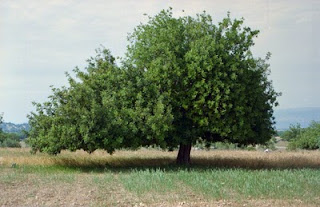[For the Ner Shalom Malakh, Summer 2010.]
There's a Talmudic parable about the carob tree. According to the rabbis (who were clearly not botanists), it takes seventy years for a carob to flower. When asked then why he was planting a carob tree when he'd never live to see its fruit, the farmer in the story says that he enjoys the fruit of a carob tree planted for him by his grandfather; similarly he is planting a carob for his grandchildren.
Planting a carob is not one of those highly touted "random acts of kindness." It's rather a deferred one - a blessing that will blossom only later, with no benefit accruing to yourself.
So what are the carob trees that were planted for us? The ocean voyages of long-gone grandparents looking for a better life, if not for themselves, then for those who would come after? The love of learning implanted in our psyches 70 generations back? The desire for community felt by Jews of central Sonoma County twenty-five years ago, many of whom are no longer part of this congregation or this county but whose imprints we still feel? Or the clubhouse built by the dedicated women of the Cotati Ladies' Improvement Club, none of whom we knew and none of whom could have foreseen that this home built to house their vision of a better world would someday nourish this holy community?
And what are the carob trees that we are planting now for our future generations? When we make decisions for our children, are we remembering to think of the future adults they will be and what they will pass on to their children? When we make decisions for our synagogue and our community, are they just about this year's programs and improvements, or are we also setting the stage for future waves that we might never know? When we think about our relationship with the Earth, do we keep in mind our posterity (if not our biological grandchildren, then our spiritual heirs, once or twice removed)?
I always try to notice the carob trees that feed me and shade me. The seeds planted in my youth by parents, teachers, great- grandparents and my groovy lakefront aunties. Some of those seeds have, thanks to this community, had a chance at last to bear some fruit, chewy and unripe though it still might be. I'm grateful for those who planted the seeds without knowing the outcome. And I will try to follow in their footsteps, planting my carob, sowing seeds without certainty, but with certain hope.
And as we begin to move toward the High Holy Day season I leave you to ask yourself: "what are the seeds I am planting?"

1 comment:
Thank You. I am not Jewish, but I learned a lot from your story. I will work on the future, not for me, but for the future.
Post a Comment